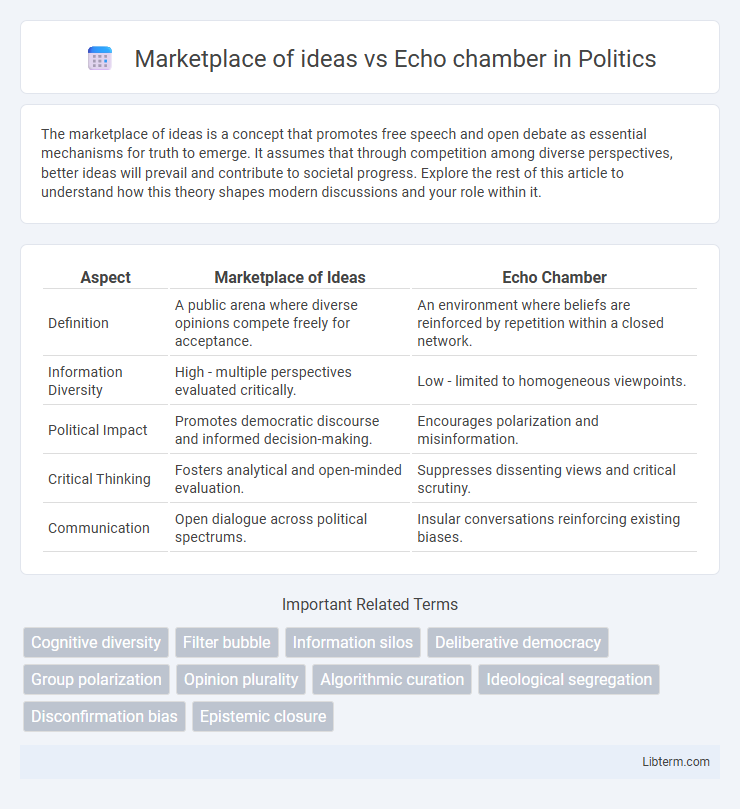The marketplace of ideas is a concept that promotes free speech and open debate as essential mechanisms for truth to emerge. It assumes that through competition among diverse perspectives, better ideas will prevail and contribute to societal progress. Explore the rest of this article to understand how this theory shapes modern discussions and your role within it.
Table of Comparison
| Aspect | Marketplace of Ideas | Echo Chamber |
|---|---|---|
| Definition | A public arena where diverse opinions compete freely for acceptance. | An environment where beliefs are reinforced by repetition within a closed network. |
| Information Diversity | High - multiple perspectives evaluated critically. | Low - limited to homogeneous viewpoints. |
| Political Impact | Promotes democratic discourse and informed decision-making. | Encourages polarization and misinformation. |
| Critical Thinking | Fosters analytical and open-minded evaluation. | Suppresses dissenting views and critical scrutiny. |
| Communication | Open dialogue across political spectrums. | Insular conversations reinforcing existing biases. |
Defining the Marketplace of Ideas
The Marketplace of Ideas is a conceptual framework that promotes open, free, and diverse exchange of thoughts where ideas compete for acceptance based on merit and evidence. This model relies on the assumption that through rational discourse and critical evaluation, truth and innovation emerge as the most valid concepts prevail over falsehoods. Contrastingly, an echo chamber restricts dialogue to homogenous viewpoints, limiting exposure to alternative perspectives and weakening the collective ability to discern truth.
Understanding the Echo Chamber Effect
The echo chamber effect occurs when individuals are exposed predominantly to information and opinions that reinforce their existing beliefs, limiting critical thinking and diverse perspectives. This phenomenon contrasts with the marketplace of ideas, which thrives on open dialogue and the free exchange of competing viewpoints for truth discovery. Understanding the echo chamber effect is essential for promoting cognitive diversity and combating polarization in digital and social media environments.
Historical Context: Origins and Evolution
The marketplace of ideas concept traces back to John Milton's 17th-century advocacy for free speech, which later influenced John Stuart Mill's 19th-century philosophy promoting open discourse for truth discovery. In contrast, echo chambers emerged as a phenomenon primarily with the advent of digital communication in the 21st century, where algorithm-driven social media platforms reinforce homogeneous viewpoints. The historical evolution highlights a shift from idealized open debate to fragmented, often polarized digital environments shaping public opinion and democratic engagement.
Key Differences Between Marketplaces and Echo Chambers
The marketplace of ideas promotes diverse perspectives, encouraging critical thinking and open debate, whereas echo chambers reinforce existing beliefs by limiting exposure to opposing viewpoints. In marketplaces, information flows freely and fosters intellectual growth, while echo chambers create cognitive biases and polarization through selective information filtering. The key difference lies in marketplaces' emphasis on truth-seeking contrasted with echo chambers' tendency toward confirmation bias and ideological homogeneity.
The Role of Technology in Shaping Discourse
Technology has transformed the marketplace of ideas by enabling diverse perspectives to reach broader audiences, yet algorithms often prioritize engagement over accuracy, fostering echo chambers. Social media platforms use recommendation systems that reinforce existing beliefs, limiting exposure to contrasting viewpoints and polarizing discourse. Artificial intelligence moderation tools can either mitigate misinformation or inadvertently suppress minority opinions, significantly shaping the quality and diversity of online conversations.
Cognitive Bias and Information Filtering
The marketplace of ideas thrives on diverse perspectives that challenge cognitive biases such as confirmation bias and availability heuristic, fostering critical thinking and informed decision-making. In contrast, echo chambers reinforce preexisting beliefs through selective exposure and information filtering, amplifying cognitive biases by limiting access to contradictory information. This filtering process narrows the information ecosystem, reducing cognitive diversity and impairing the ability to evaluate evidence objectively.
Benefits of Open Debate and Diversity of Thought
Open debate in the marketplace of ideas fosters innovation and critical thinking by exposing individuals to diverse perspectives, which enhances problem-solving and societal progress. Unlike echo chambers that reinforce existing beliefs, open forums encourage intellectual humility and adaptability through continuous challenge and refinement of ideas. This diversity of thought promotes democratic engagement and helps prevent polarization by facilitating understanding across different viewpoints.
Risks and Consequences of Insular Communities
Insular communities within echo chambers limit exposure to diverse viewpoints, increasing the risk of misinformation and reinforcing cognitive biases that undermine critical thinking. The marketplace of ideas thrives on robust debate and diverse perspectives, essential for intellectual growth and societal progress. Lack of engagement with opposing views in echo chambers can lead to polarization, social fragmentation, and decreased tolerance for dissenting opinions.
Real-World Examples: Marketplace vs Echo Chamber
The American Civil Rights Movement exemplifies the marketplace of ideas by fostering diverse viewpoints that challenged segregation and promoted equal rights through open debate. In contrast, social media platforms often create echo chambers by algorithmically reinforcing users' existing beliefs, such as during the 2016 U.S. presidential election where misinformation spread within insulated networks. Real-world outcomes show that marketplaces encourage societal progress through dialogue, while echo chambers can deepen polarization and hinder consensus-building.
Strategies for Fostering Healthy Public Dialogue
Encouraging diverse perspectives and critical thinking serves as a core strategy for fostering a marketplace of ideas, promoting open discourse where competing viewpoints challenge and refine one another. Designing digital platforms with algorithms that prioritize diversity over personalization helps mitigate echo chamber effects by exposing users to varied opinions and reducing ideological segregation. Facilitating community moderation and fact-checking further strengthens healthy public dialogue by ensuring accurate information circulation and respectful engagement across different social groups.
Marketplace of ideas Infographic

 libterm.com
libterm.com